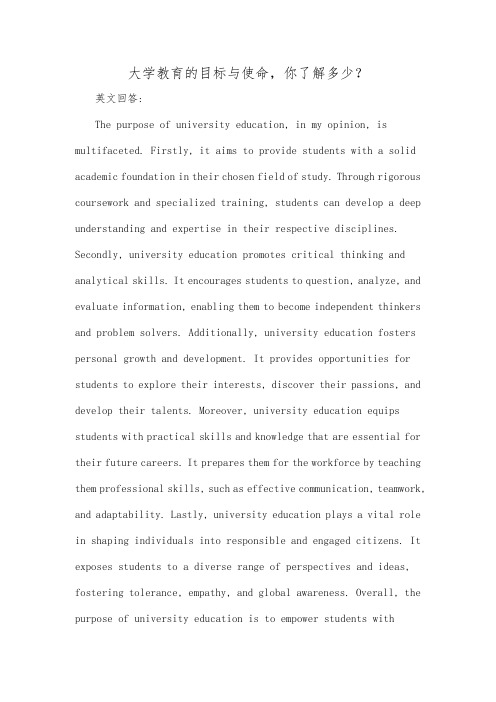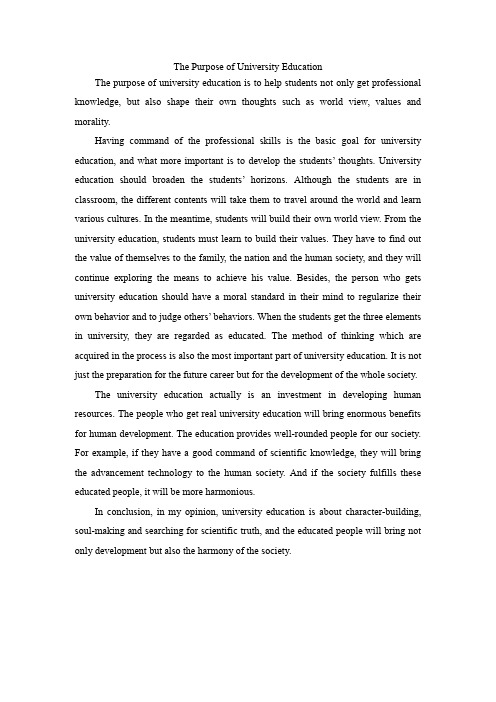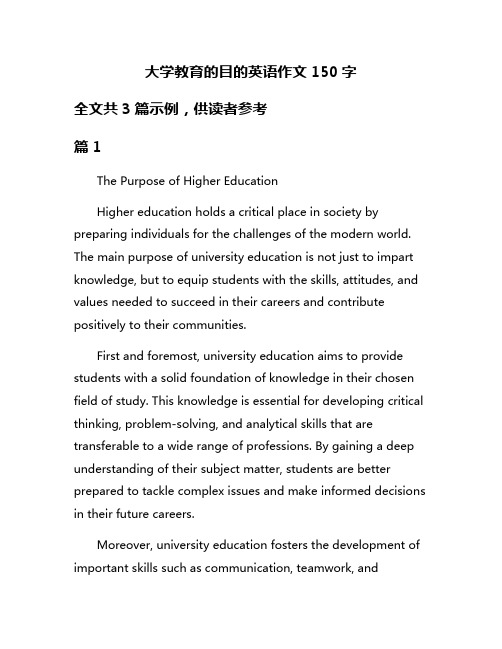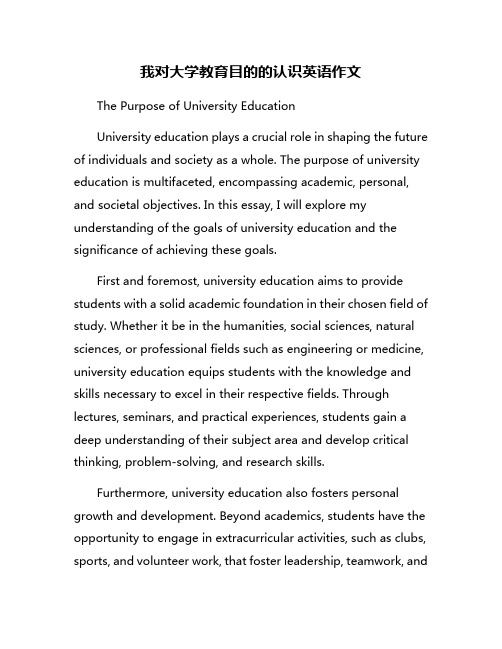大学教育的目标The Goal of University Education
大学教育的目的英语作文结尾

大学教育的目的英语作文结尾In the grand tapestry of human progress, the purpose of university education stands as a thread of profound significance, weaving together the aspirations of individuals with the advancement of society. It is not merely a stepping stone to a career, but a crucible where the minds of tomorrow are forged, where critical thinking is honed, and where the seeds of innovation are sown. The true essence of university education lies in its ability to equip students with aversatile toolkit of knowledge, skills, and values that transcend the boundaries of their chosen fields. It is about nurturing a sense of curiosity, fostering a spirit of inquiry, and cultivating the ability to adapt and innovate in an ever-changing world. As we stand at the crossroads of the future,it is the responsibility of our institutions of higherlearning to ensure that the graduates they produce are notjust job-ready, but life-ready, capable of contributing meaningfully to the global community and driving the engineof progress forward. In essence, the ultimate goal ofuniversity education is to ignite a lifelong passion for learning, to empower individuals to be agents of change, andto prepare them to navigate the complexities of the modern world with wisdom, empathy, and resilience.。
我对大学教育目的的认识英语作文

我对大学教育目的的认识英语作文(中英文实用版)The purpose of university education, in my perspective, extends far beyond the acquisition of book knowledge.It is a transformative journey that cultivates critical thinking, independence, and personal growth.在我看来,大学教育的目的远不止于书本知识的获取。
它是一次培养批判性思维、独立性和个人成长的转变之旅。
University is not merely a place for intellectual development; it"s a microcosm of society where students can refine their social skills and ethical values.大学不仅是智力发展的场所,它还是一个缩影社会,学生可以在这里磨炼社交技巧和道德价值观。
Moreover, the true essence of university education lies in its ability to inspire lifelong learning and foster a passion for discovery.此外,大学教育的真正精髓在于其激发终身学习的能力和培养对发现的热情。
It encourages students to explore diverse fields, challenge conventional wisdom, and become active contributors to the world.它鼓励学生探索不同领域,挑战传统观念,成为世界的积极贡献者。
In conclusion, the ultimate purpose of university education is not just to impart knowledge, but to shape well-rounded individuals who are equipped to face the complexities of life.总之,大学教育的最终目的不仅仅是传授知识,而是塑造能够面对生活复杂性的全面发展的个体。
大学教育的目标与使命,你了解多少?

大学教育的目标与使命,你了解多少?英文回答:The purpose of university education, in my opinion, is multifaceted. Firstly, it aims to provide students with a solid academic foundation in their chosen field of study. Through rigorous coursework and specialized training, students can develop a deep understanding and expertise in their respective disciplines. Secondly, university education promotes critical thinking and analytical skills. It encourages students to question, analyze, and evaluate information, enabling them to become independent thinkers and problem solvers. Additionally, university education fosters personal growth and development. It provides opportunities for students to explore their interests, discover their passions, and develop their talents. Moreover, university education equips students with practical skills and knowledge that are essential for their future careers. It prepares them for the workforce by teaching them professional skills, such as effective communication, teamwork, and adaptability. Lastly, university education plays a vital role in shaping individuals into responsible and engaged citizens. It exposes students to a diverse range of perspectives and ideas, fostering tolerance, empathy, and global awareness. Overall, the purpose of university education is to empower students withknowledge, skills, and values that will enable them to succeed academically, professionally, and personally.中文回答:我认为大学教育的目的是多方面的。
The purpose of university education

The Purpose of University EducationThe purpose of university education is to help students not only get professional knowledge, but also shape their own thoughts such as world view, values and morality.Having command of the professional skills is the basic goal for university education, and what more important is to develop the students’ thoughts. University education should broaden the students’horizons. Although the students are in classroom, the different contents will take them to travel around the world and learn various cultures. In the meantime, students will build their own world view. From the university education, students must learn to build their values. They have to find out the value of themselves to the family, the nation and the human society, and they will continue exploring the means to achieve his value. Besides, the person who gets university education should have a moral standard in their mind to regularize their own behavior and to judge others’ behaviors. When the students get the three elements in university, they are regarded as educated. The method of thinking which are acquired in the process is also the most important part of university education. It is not just the preparation for the future career but for the development of the whole society.The university education actually is an investment in developing human resources. The people who get real university education will bring enormous benefits for human development. The education provides well-rounded people for our society. For example, if they have a good command of scientific knowledge, they will bring the advancement technology to the human society. And if the society fulfills these educated people, it will be more harmonious.In conclusion, in my opinion, university education is about character-building, soul-making and searching for scientific truth, and the educated people will bring not only development but also the harmony of the society.。
大学的学习目标英语作文

大学的学习目标英语作文Here is a 1000-word essay on the topic of "The Learning Objectives of University Education" written in English:The primary objective of university education is to equip students with the necessary knowledge, skills, and critical thinking abilities to excel in their chosen fields and contribute meaningfully to society. This multifaceted goal encompasses a range of interrelated components that work in concert to foster well-rounded individuals capable of navigating the complexities of the modern world.Firstly, university education aims to provide students with a comprehensive understanding of their academic discipline. This involves delving deep into the theoretical foundations, core concepts, and recent advancements within a particular field of study. By acquiring this specialized knowledge, students develop the expertise required to engage in research, analysis, and problem-solving within their area of focus. Whether it's mastering the intricacies of engineering, unraveling the complexities of the social sciences, or exploring the latest breakthroughs in the natural sciences, this depth of understanding lays the groundwork for students to become leaders and innovators in their respective industries.Alongside the pursuit of disciplinary knowledge, university education also emphasizes the development of critical thinking and analytical skills. Students are challenged to question assumptions, examine multiple perspectives, and engage in rigorous reasoning to reach well-informed conclusions. This process of critical inquiry fosters the ability to think independently, identify and evaluate complex problems, and devise innovative solutions. These skills are not confined to a single field of study but are applicable across a wide range of professional and personal contexts, empowering students to navigate the ever-changing landscape of the 21st century.Another key objective of university education is to nurture effective communication skills. In today's interconnected world, the ability to articulate ideas clearly, persuasively, and empathetically is paramount. University curricula often include courses and workshops focused on honing written, oral, and interpersonal communication abilities. Students learn to craft compelling arguments, engage in constructive dialogue, and adapt their communication styles to diverse audiences. These skills are essential not only for academic success but also for professional advancement and personal fulfillment.Furthermore, university education aims to cultivate a sense of social responsibility and global citizenship. Through coursework,community engagement, and extracurricular activities, students develop an understanding of the complex social, political, and environmental issues facing the world. They learn to appreciate diverse perspectives, recognize their role as active members of local and global communities, and commit to making positive contributions. This holistic approach encourages students to consider the broader implications of their actions and to become agents of change, committed to addressing societal challenges and promoting the greater good.Equally important, university education fosters the personal growth and well-being of students. The university experience provides a supportive environment for individuals to explore their interests, discover their passions, and develop a sense of self-awareness and self-confidence. Through counseling services, wellness programs, and opportunities for self-reflection, students are empowered to cultivate a healthy work-life balance, manage stress, and maintain their mental and physical well-being. This emphasis on personal development equips students with the resilience and adaptability needed to navigate the complexities of life beyond the university walls.Finally, a key objective of university education is to prepare students for successful careers and lifelong learning. By offering a diverse range of academic programs, internships, and career counselingservices, universities enable students to acquire the skills and experiences necessary to thrive in their chosen professions. Moreover, the critical thinking and problem-solving abilities developed during the university experience instill in students a passion for continuous learning and adaptation. This fosters a mindset of adaptability and lifelong growth, ensuring that graduates are equipped to navigate the ever-evolving demands of the job market and contribute to the knowledge economy throughout their careers.In conclusion, the learning objectives of university education encompass a multifaceted set of goals designed to foster well-rounded, socially responsible, and intellectually curious individuals. From acquiring disciplinary expertise and critical thinking skills to developing effective communication abilities and a sense of global citizenship, the university experience prepares students to thrive in their personal and professional lives. By prioritizing this holistic approach to education, universities play a vital role in shaping the leaders, innovators, and engaged citizens of tomorrow.。
大学教育的目的英语作文150字

大学教育的目的英语作文150字全文共3篇示例,供读者参考篇1The Purpose of Higher EducationHigher education holds a critical place in society by preparing individuals for the challenges of the modern world. The main purpose of university education is not just to impart knowledge, but to equip students with the skills, attitudes, and values needed to succeed in their careers and contribute positively to their communities.First and foremost, university education aims to provide students with a solid foundation of knowledge in their chosen field of study. This knowledge is essential for developing critical thinking, problem-solving, and analytical skills that are transferable to a wide range of professions. By gaining a deep understanding of their subject matter, students are better prepared to tackle complex issues and make informed decisions in their future careers.Moreover, university education fosters the development of important skills such as communication, teamwork, andleadership. Through group projects, presentations, and extracurricular activities, students learn to collaborate with others, resolve conflicts, and take on leadership roles. These skills are invaluable in the professional world, where individuals must work effectively with colleagues and clients to achieve common goals.In addition to knowledge and skills, higher education also aims to cultivate positive attitudes and values in students. Universities encourage intellectual curiosity, creativity, and a commitment to lifelong learning. They also promote ethical behavior, social responsibility, and respect for diversity. By instilling these values in students, universities help createwell-rounded individuals who can contribute positively to their communities and society as a whole.Overall, the ultimate goal of higher education is to empower students to achieve their full potential and make a positive impact on the world around them. By providing a strong foundation of knowledge, developing essential skills, and fostering positive attitudes and values, universities prepare students to succeed in their careers and contribute meaningfully to society. In this way, higher education plays a vital role in shaping the future of individuals and society as a whole.篇2The purpose of university education is to provide students with the knowledge, skills, and experiences that will enable them to succeed in their chosen careers and to become responsible and productive members of society.One of the main goals of university education is to prepare students for the workforce by equipping them with the practical skills and theoretical knowledge needed to excel in their chosen fields. This may involve teaching students how to think critically, problem-solve, and work effectively in teams. It may also involve providing students with opportunities for internships, research projects, and other hands-on learning experiences that will help them put their knowledge into practice.In addition to preparing students for their careers, university education also aims to help students develop a broad range of personal qualities and values that will serve them well throughout their lives. This may include fostering a sense of curiosity and openness to new ideas, teaching students to communicate effectively, and encouraging them to think ethically and act with integrity in all aspects of their lives.Overall, the purpose of university education is to help students become well-rounded individuals who are not only capable of excelling in their chosen careers but also of making a positive contribution to society. By providing students with a solid foundation of knowledge, skills, and values, university education empowers them to achieve their goals and lead fulfilling lives.篇3The Purpose of University EducationUniversity education is often considered the pinnacle of a person's academic journey. It aims to equip students with the necessary knowledge, skills, and capabilities to succeed in their chosen field and become responsible citizens of society.One of the primary purposes of university education is to provide students with in-depth knowledge and expertise in a particular subject area. This specialized learning allows students to delve deeper into their fields of interest, gaining a thorough understanding of theoretical concepts and practical applications.Furthermore, university education aims to develop critical thinking and analytical skills in students. By engaging in rigorous academic study and research, students learn how to analyzecomplex problems, evaluate various perspectives, and formulate logical arguments. These skills are essential for success in the professional world, where critical thinking is highly prized.In addition to academic knowledge and critical thinking skills, university education also fosters personal growth andself-discovery. Through interactions with peers, professors, and mentors, students develop valuable communication, teamwork, and leadership abilities. They also have the opportunity to explore their own interests, values, and beliefs, shaping their identity and worldview.Moreover, university education aims to instill a sense of social responsibility and ethical awareness in students. By exposing them to diverse cultures, perspectives, and experiences, universities promote empathy, tolerance, and global citizenship. Students are encouraged to engage in community service, volunteer work, and social activism, helping them to understand the importance of giving back to society.Ultimately, the purpose of university education is to empower students to become lifelong learners and contributing members of society. By providing them with the knowledge, skills, and values needed to thrive in a complex andever-changing world, universities help students realize their full potential and make a positive impact on the world around them.。
我对大学教育目的的认识英语作文

我对大学教育目的的认识英语作文The Purpose of University EducationUniversity education plays a crucial role in shaping the future of individuals and society as a whole. The purpose of university education is multifaceted, encompassing academic, personal, and societal objectives. In this essay, I will explore my understanding of the goals of university education and the significance of achieving these goals.First and foremost, university education aims to provide students with a solid academic foundation in their chosen field of study. Whether it be in the humanities, social sciences, natural sciences, or professional fields such as engineering or medicine, university education equips students with the knowledge and skills necessary to excel in their respective fields. Through lectures, seminars, and practical experiences, students gain a deep understanding of their subject area and develop critical thinking, problem-solving, and research skills.Furthermore, university education also fosters personal growth and development. Beyond academics, students have the opportunity to engage in extracurricular activities, such as clubs, sports, and volunteer work, that foster leadership, teamwork, andcommunication skills. University is a time for self-discovery and exploration, where students can discover their passions, interests, and values, and develop a sense of identity and purpose.Moreover, university education plays a crucial role in promoting societal progress and development. Universities are hubs of innovation, research, and knowledge creation that drive economic growth, technological advancement, and social change. Through research and collaboration with industry, government, and civil society, universities contribute to addressing pressing societal challenges, such as climate change, poverty, inequality, and healthcare. In addition, universities serve as engines of social mobility, providing opportunities for individuals from diverse backgrounds to access higher education and realize their full potential.In conclusion, the purpose of university education is to empower individuals with the knowledge, skills, and values to succeed in their chosen field, lead fulfilling lives, and contribute to the betterment of society. By achieving these goals, universities play a vital role in shaping the future of individuals and society, fostering a culture of lifelong learning, innovation, and social responsibility. As a student, I am committed to makingthe most of my university education and leveraging it to make a positive impact on the world.。
雅思大作文范文:大学教育的目的

Some people believe the aim of university education is to help graduates get better jobs. Others believe there are much wider benefits of university education for both individuals and society.Discuss both views and give your opinion.These days, more and more people are making the choice to go to university. While some people are of the opinion that the only purpose of a university education is to improve job prospects, others think that society and the individual benefit in much broader ways.现在,越来越多的人选择上大学。
虽然有些人认为大学教育的唯一目的是改善就业前景,但其他人认为社会和个人在更广泛的方面受益。
It is certainly true that one of the main aims of university is to secure a better job. The majority of people want to improve their future career prospects and attending university is one of the best ways to do this as it increases a person’s marketable skills and attractiveness to potential employers. In addition, further education is very expensive for many people, so most would not consider it if it would not provide them with a more secure future and a higher standard of living. Thus job prospects are very important.毫无疑问,大学的主要目标之一就是找到一份更好的工作。
- 1、下载文档前请自行甄别文档内容的完整性,平台不提供额外的编辑、内容补充、找答案等附加服务。
- 2、"仅部分预览"的文档,不可在线预览部分如存在完整性等问题,可反馈申请退款(可完整预览的文档不适用该条件!)。
- 3、如文档侵犯您的权益,请联系客服反馈,我们会尽快为您处理(人工客服工作时间:9:00-18:30)。
大学教育的目标The Goal of University Education
Nowadays most people go to university not only to learn new knowledge but to get a degree. Many of them no longer care about what they really learn in university, they care more about whether they will get the degree or not. They regard the degree as a golden key to a better jobs or higher salaries. For them, nothing is more important than a degree in university. In my point of view, I cannot agree to this idea.
现在大多数人上大学不是为了学习新的知识,而是为了要得到学位。
大多人都不再关心他们在大学真正学到什么,他们关心的是是否能得到学位。
他们把学位作为找到更好工作或获得更高薪水的金钥匙。
对他们来说,没有什么比大学学位更重要。
在我看来,我不同意这个观点。
In the first place, degree is nothing but a paper that can prove you have finished your courses. Most students don’t realize what helps them to find a good job is what they really learn from university, the professional course, and the social skills and so on. In addition, having certificates is more important than having a degree. For instance, if you are looking for a translation job, you certainly need a CET-4 or CET-6 certificate. if you want to be a high school
teacher, you need more certificate to prove yourself that you are fit for this job, such as TEM-8 and teacher certificate which is not a degree can show your abilities.
首先,学历只不过是一张证明你已经完成学业的纸而已。
大多数学生并没意识到真正能帮助他们找到一份好工作的是他们在大学里真正学到的东西,比如专业课,社会技能等。
此外,证书比学位证书更重要。
例如,如果您正在寻找一份翻译的工作,你一定需要一个大学英语四或六级的证书。
如果你想成为一名中学教师,你需要更多的证书来证明你自己适合这份工作,如英语专业八级证书和教师资格证书,这虽然不是学位却能显示你的能力。
In the second place, having a good personal relationship is much nicer than having a degree. In the social net, you have more friends means you have more choices. For example, many students do not choose the right major in university because their parents chose for them, so that they may not work hard. In that case, this kind of students should spend more time to learn what they are really interested in and make more friends. It’s much better than they spend the whole time to learn the major which they don’t like at all.
第二,有一个良好的人际关系比拥有学位要好得多。
在社交网站上,你拥有更多的朋友意味着你有更多的选择。
例如,许多
学生没有选择恰当的大学主要是因为他们的父母为他们做了选择,以至于他们可能不努力学习。
在这种情况下,这类学生应该花更多的时间去学习自己真正感兴趣的东西,交更多的朋友。
这样比他们把全部时间花在他们不感兴趣的专业上要好得多。
To sum up, students should not care too much about their degree, and they should focus on what is truly needed for their future life. The goal of university education is not just to get a degree, but the really useful knowledge and practical experience.
总之,学生不应该太在意他们的学历,他们应该关注他们未来生活真正需要的是什么。
大学教育的目标不仅仅是获得一个学位,而是真正实用的知识和实践经验。
